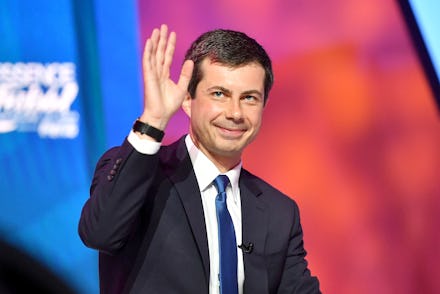Pete Buttigieg's 2020 campaign, by the numbers

Not many people had heard of "Mayor Pete" before he launched himself into the 2020 election cycle. But now, Pete Buttigieg — the small-town mayor of South Bend, Indiana — has found himself not only among the top five candidates to become the Democratic presidential nominee, but in the harsh spotlight that comes along with that as well. The statistics about Buttigieg's 2020 campaign show how far he's come and also, potentially, how far he has to fall.
In mid-November, the previously unknown Buttigieg scored the top spot in the Des Moines Register/CNN/Mediacom poll. Twenty-five percent of likely Democratic caucusgoers said that Buttigieg was their No. 1 pick. Two months earlier, in September, Warren was enjoying the spot as Iowa's top choice among Democratic voters.
But since his rise in polling and popularity, and as more detailed versions of his policies have come out, Buttigieg has seen intensified scrutiny by some people on the left who feel that he exemplifies the stereotype of a white, affluent, college-educated politician who might not recognize his own privilege. "I’d like to believe it’s my qualities and my message, but I’ve been reflecting on this because one of the things about privilege, especially things like white privilege or male privilege, is that you don’t think about it very much," he told The Daily Show's Trevor Noah in April. "And so, I try to check myself and make sure I try to understand the factors that help explain why things are going well."
And things are indeed going well. Here's how Buttigieg's campaign looks when you break down the numbers.
Polling average: 10%
The New York Times's latest polling analysis has Buttigieg at an average of 10% in the national polls. This puts him in fourth place among the current Democratic primary candidates, behind Vice President Joe Biden, Vermont Sen. Bernie Sanders, and Massachusetts Sen. Elizabeth Warren, respectively.
Fundraising total: $50,936,509
According to OpenSecrets's compilation of data from the Federal Election Commission, Buttigieg has raised nearly $51 million. Just over half of that — 52.48% — has come from large contributions, and just under half — 47.44% — has come from small individual contributions. A majority of donations (more than 60%) are from men, and a significant amount of donors are in the electronics/communications or finance/insurance/real estate sectors.
Buttigieg is one of the top fundraisers in the Democratic race. Only Sanders and Warren have raised more money than him so far. Sanders has raked in $73 million, and Warren has collected $60 million. Biden has raised over $36 million.
Money spent: $27,557,991
Buttigieg has spent over $27.5 million of that nearly $51 million total, about 54% of the money he has raised. That puts him almost exactly on par with Biden, who has spent $27.7 million.
Meanwhile, Sanders has spent $40 million, and Warren has spent $34 million.
Debates: 5, soon to be 6
Like many of the top candidates, Buttigieg has been in all five debates so far. Sanders, Warren, Biden, Minnesota Sen. Amy Klobuchar, and entrepreneur Andrew Yang have also been in every debate. California Sen. Kamala Harris had also been in all five debates before she dropped out of the race on Dec. 3.
Buttigieg has been invited to the sixth debate, slated for Dec. 19, along with six other candidates (Sanders, Warren, Biden, Klobuchar, Yang, and billionaire Tom Steyer). New Jersey Sen. Cory Booker and Hawaii Rep. Tulsi Gabbard, who had previously been at every debate, did not qualify to participate in the December event.
Last debate speaking time: 12:56
Buttigieg had the second-highest speaking time in the Nov. 20 debate, clocking in at nearly 13 minutes. Only Warren spoke more than him, at 13 minutes and 29 seconds. Biden spoke for 12 minutes and 48 seconds, Sanders had 11 minutes and 47 seconds, and Yang spoke the least with just 6 minutes and 48 seconds.
According to a New York Times analysis, four of Buttigieg's minutes (nearly one-third of his speaking time) were devoted to one big issue: electability.
Time in the presidential race: 47 weeks
Buttigieg announced his presidential bid in a launch video on Jan. 23. That's 328 days in the race, or over 10 months and three weeks.
January is when a majority of candidates announced their run, including Gabbard, Harris, former Housing and Urban Development Secretary Julián Castro, Marianne Williamson, and New York Sen. Kirsten Gillibrand, who dropped out in August. Warren announced her bid last New Year's Eve, Dec. 31, 2018. The candidates who have been in the race the longest are former Maryland Rep. John Delaney, who declared he would run on June 28, 2017, and Yang, who filed his paperwork with the FEC on Nov. 6, 2017.
Age: 37
Officially a millennial, Buttigieg will celebrate his 38th birthday on Jan. 19. The millennial years are 1981 to 1996. Buttigieg was born in 1982, and if elected, would become the youngest president ever.
Theodore Roosevelt, who was president from 1901 to 1909, currently holds the record of youngest president, having begun his term at age 42. Trump is the oldest person to be sworn in as president of the United States, at age 70, though Warren, Sanders, or Biden would take over that title if they were elected.
Net worth: ~$100,000
Forbes estimates Buttigieg's net worth at $100,000, the lowest of any 2020 presidential candidate. "I actually live in a middle-class lifestyle, in a middle-class neighborhood, in the American Midwest," he once told CNBC.
The other top Democratic contenders have a significantly higher estimated net worth. Forbes puts Warren's at $12 million, Biden's at $9 million, and Sanders's at $2.5 million.